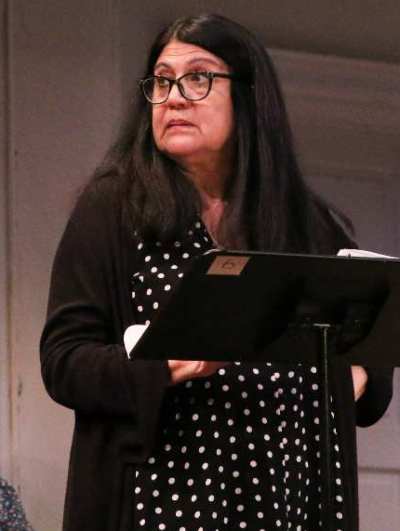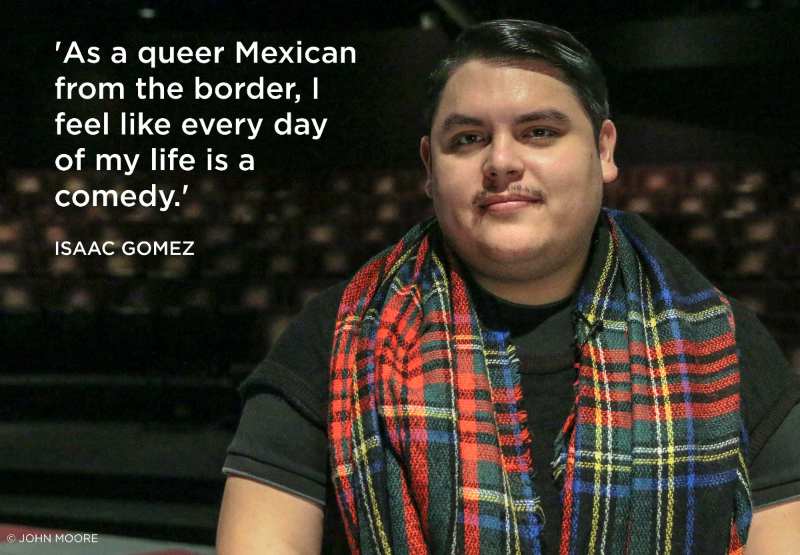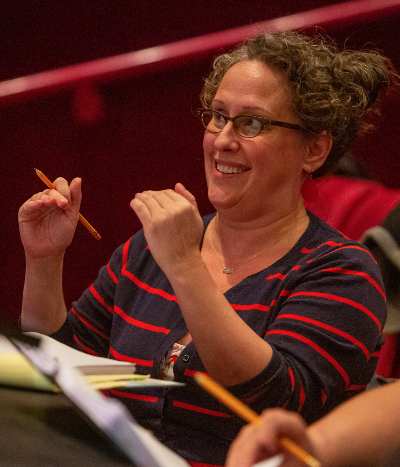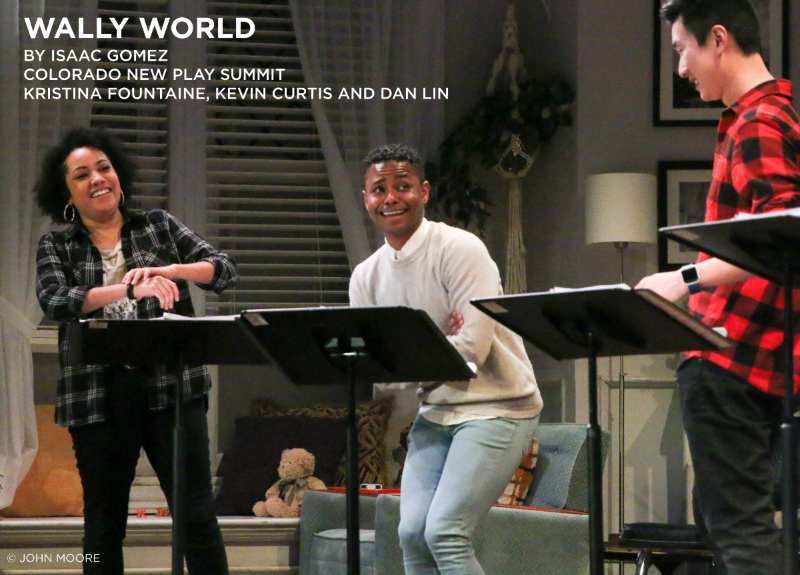DCPA NEWS CENTER
Enjoy the best stories and perspectives from the theatre world today.
Enjoy the best stories and perspectives from the theatre world today.
This article was published on February 21, 2019
Video by DCPA Video Producer David Lenk and Senior Arts Journalist John Moore.
In the final part of our daily five-part series for the DCPA NewsCenter, we introduce you to the plays and playwrights featured at the Denver Center’s 2019 Colorado New Play Summit through February 24. Over the past 14 years, 29 plays introduced at the Summit have gone on to be premiered as fully staged productions on the Denver Center Theatre Company’s mainstage season. Today: Isaac Gomez, playwright of Wally World.
The play in a nutshell: Inspired by his own mother’s experience as a woman who worked her way up through the ranks of an El Paso superstore, Isaac Gomez’s touching comedy Wally World looks for magic in the mundane as co-workers search for purpose in a place that has never seen purpose in them. The story is set on Christmas Eve, just before the only day of the year the 24-hour retail store is closed. As secrets come to life that may destroy more than their holiday cheer, the manager, Andy, does everything in her power to keep her store in line and her employees in check.
The playwright at a glance: Isaac Gomez is a Chicago-based playwright originally from the border town of El Paso, Texas/Juárez, Mexico. His play La Ruta will receive its world premiere at Steppenwolf Theatre this fall. He is currently under commission from the Denver Center Theatre Company, South Coast Repertory, Goodman Theatre, Actors Theatre of Louisville and five others. He won the 2017 Jeffry Melnick New Playwright Award at New York’s Primary Stages.
Here is more of Isaac Gomez’s conversation with DCPA Senior Arts Journalist John Moore:
John Moore: Introduce us to the world of your play.

Evelina Fernandez plays Andy, a character based on the playwright’s mother, in ‘Wally World.’ Photo by Adams Viscom.
Isaac Gomez: Wally World is an homage to my mother. She has been working at Walmart for the past 23 years. She worked her way up from cashier and she is now the store manager of one of the largest retail Walmarts in the country.
John Moore: Tell us where that Walmart is.
Isaac Gomez: The play takes place in El Paso, Texas, right on the border with Juárez, Mexico. My mother’s Walmart is closest to the Zaragoza Bridge. So if you walk outside the store you can see the ramp that goes into Juárez. It’s right there. That means a lot of my mother’s customers are from both El Paso and Juárez.
John Moore: And how is that important to your play?
Isaac Gomez: I like to call Wally World my “Walmart Chekhov.” The main character is Andy, who’s based on my mom, as well as 10 members of her core team who are all based on real people. We follow their journey as they try to figure out who they are and why they are here. I call the store Wally World in my story, but it is still set on the border, and it still carries those same border sensibilities.
John Moore: Tell me about them.
Isaac Gomez: These are people who are perpetually displaced and have a sense of a constant contradiction within themselves. When you live in a border city, your feet are planted in two places at once. A bridge or a wall is enough to say you are either here or you are there. But when you live in a border city, you’re everywhere. And the rest of the country is trying to pretend you don’t exist and that you don’t matter. That’s at the core of who these people are – and that’s my home.
John Moore: So much to talk about there but let’s start with your mom. Tell us more about who she is, and why her story might defy what we think a career at Walmart might entail.
Isaac Gomez: Absolutely. My mom is one of the most inspiring people I know. I consider her a superhero. She had my oldest brother when she was 16, and she had to drop out of high school to take care of him. She did not get a diploma. She did not go to college. And yet, she managed to work her way up into a high-profile position at a Walmart that pays really well. Now that was not my experience growing up because she was not a store manager at that time. The irony and the hilarity is, now that all of her kids are gone, she’s making a lot of money and doesn’t know what to do with it because she’s just not used to having it. And she’s still the same humble woman she’s always been. And now she is starting to figure out what does joy mean for her?

John Moore: What kind of a boss is she?
Isaac Gomez: Because she did not go to school for leadership, her style and her skills might be a bit questionable, but they’re incredibly effective because my mom leads from her gut. And that is a quality I’ve carried on from her. That’s also true in my writing.
John Moore: It sounds like Walmart gave her a career opportunity that you don’t think she would have gotten anywhere else?

Bianca Laverne Jones (Courtney) and Rakeem Lawrence (stage directions) rehearsing for ‘Wally World.’ Photo by John Moore.
Isaac Gomez: It’s true. I’m not defending the corporation and its questionable ethics regarding workplace rights and equity, especially for older people and people with disabilities. And yet, part of the contradiction is that this is a store that allowed my mother to work her way up from nothing despite her circumstances and despite not having gone to school or having been formally trained for a management position. Sometimes when I talk to my mom and I criticize the way Walmart does things, and she will say, “Not my store!” She has worked adamantly to ensure that her store is not like other stores, because her store is the one that gave her a chance.
John Moore: At any given time there might be 300 people working in a Walmart, and you’ve grown up watching a lot of them at your mother’s knee. Tell us about the people you have chosen to write about, and why their story makes for good play.
Isaac Gomez: Ever since I was a child, my mom would bring me to work – especially when she didn’t have child care – and I really got to know the people she’s surrounded herself with on a deep and personal level. When she became a store manager, I was already an adult and going to college in Austin, Texas. But when I would go home, my mom would have me go to work with her to help her out. I would pay very close attention to how her employees interacted with her, and I would describe it as with a sense of both mutual respect and as fear. That’s what happens sometimes when women are in leadership. That my mother was very good at her job might translate to some as her being a bitch. That was really hard for me, but it did allow me to really lean into the why. Why do people think this about my mom? And why are her employees the way that they are? And when I thought about her employees, I realized that most them have been working at Walmart for two decades – except for the younger folks who got their degrees in business and didn’t have to work their way up before they got made a manager. And so there’s a lot of contention and conflict. These are two types of people: They’re either dreamers or they’re diers. And the question for all 11 of these characters is which ones are dreamers and which ones will die here?
John Moore: Talk about your decision to set the play on Christmas Eve and why that day is different from any other day of the year at Walmart.
Isaac Gomez: So Walmart is open 24 hours a day, 7 days a week, 364 days a year. Christmas Day is the only day the store ever closes – usually at 6 p.m. on Christmas Eve. So that day is wild. You’re talking 10,000 last-minute Christmas shoppers on average between the hours of 6 a.m. and 6 p.m. That’s a lot of people. Walmart is the kind of place where you can get a lot done in short period of time, and it’s not very expensive. So tensions are high for both the customers and the employees. When you’re stuck at a place like that for a long period of time and those fluorescent lights are brighter than anything and you’re dealing with customers who are not always kind and colleagues whose common sense might not come easily, it’s a recipe for great disaster.
John Moore: Do they even shut off those florescent lights on Christmas Eve? Is there even a switch?
Isaac Gomez: I love that you ask that question because that’s what they ask themselves every year. They’re like: “There’s a book buried somewhere about how to close the store.” And, “Is there even a key to the front door? How do we actually lock this place up?” It’s really funny.
John Moore: So when you talk about your play, it seems rife for quirky comic characters, like NBC’s sit-com “Superstore.” But it also sounds like it could be a serious socio-economic commentary. And it also sounds like it could be a political border play. Is it all of those things?

‘Wally World’ Director Meredith McDonough. Photo by Adams VisCom.
Isaac Gomez: Wally World is most certainly a comedy. It is also a border play. And it is a commentary on certain socio-political identities and experiences because that’s my life. As a queer Mexican from the border, I feel like every day is a comedy based on who I am and where I am. Just because you leave the border doesn’t mean the border ever leaves you. Who I am as a person is hugely defined by that, and that doesn’t go away. And that’s true for my characters, too.
John Moore: You speak passionately and poignantly on social media about what’s going on in your hometown of El Paso right now. In what ways is that relevant to your play?
Isaac Gomez: In their book, Gloria Anzaldúa and Cherríe Moraga expressed so beautifully and brilliantly and eloquently this idea that “We didn’t cross the border. The border crossed us.” [“This Bridge Called My Back: Writings by Radical Women of Color,” 1986]. That sentiment is literal in that borders didn’t really exist until they were forced by colonial entities, primarily the Spanish, English and French. The Mexican-American War largely defined what the border is and isn’t. And when you look at states like Texas, Arizona and California and how the border constantly shifted – especially Texas, which was its own country for a hot minute – the people don’t leave when the border moves. They stay because that’s where they live. The people who work at Wally World didn’t ask for this large, multi-billion-dollar corporation to be built on land that was stolen. It’s just something that happened. So how do you live with that? How do you find joy in that? How do you find empowerment in that? How do you push against that?
John Moore: What are your thoughts on your first Colorado New Play Summit?
Isaac Gomez: For this play, the Colorado New Play Summit is incredibly useful to me because it is a full, two-act play with 11 people. So there is a lot happening. And although this is the play’s third developmental experience, this is the first time I have been able to allow myself to work gradually and thoughtfully versus quickly and rapidly. It is an incredible privilege to have the opportunity to go back after the first weekend to work on the play again and feel really strong and confident in what we’re going to present in the second weekend. It’s so funny because whenever I ask other playwrights what they wish they’d have more of, money is always mentioned, but not as much as time and space. If you just have more time and space, a lot can happen, and the Denver Center provides us a beautiful opportunity to have both.

John Moore: And in closing: Why do you think this is the right time for this play?
Isaac Gomez: Sadly, in our country, there is a strong anti-Mexican rhetoric built into our politics that has bled into our society and is therefore bleeding into the culture. Not that it hasn’t always been that way, but when it is spoken about so fervently and unapologetically with the specific intention of creating an us-versus-them mentality, for those of us who occupy both spaces, that makes it an incredibly difficult time to be a person, let alone an artist. And when I think about Wally World, I think about what it can do to combat that rhetoric by showing them that these people in this place are not what you think they are. If anything, there are a lot like you. They’re really funny, and they have dreams and they have families and they have a deep-seeded commitment to people. My hope is that my play can be seen as an alternative to what I believe are lies and dangerous rhetoric.
John Moore: Is your mom going to be here?
Isaac Gomez: No, but she sends her love.
John Moore: Has she read it?
Isaac Gomez: She came to a reading in Dallas, and she was smiling and laughing the whole time. One of my favorite things is when people see themselves in my plays. That’s actually rare in the American theatre landscape, especially for Mexican women, and that breaks my heart. And so when they come to my plays, and I watch them watch themselves, I get a sense of them being both broken and full at the same time. That was true of my mom.
John Moore: What did she say about the play?
Isaac Gomez: The only thing she said to me after was: “I have notes.”
John Moore: And I’m sure you’ve incorporated them into your revisions like any good son would, right?
Isaac Gomez: Well, she never gave me her notes.
John Moore was named one of the 12 most influential theater critics in the U.S. by American Theatre Magazine in 2011. He has since taken a groundbreaking position as the Denver Center’s Senior Arts Journalist.
In The Ricketson Theatre
Cast and crew:
